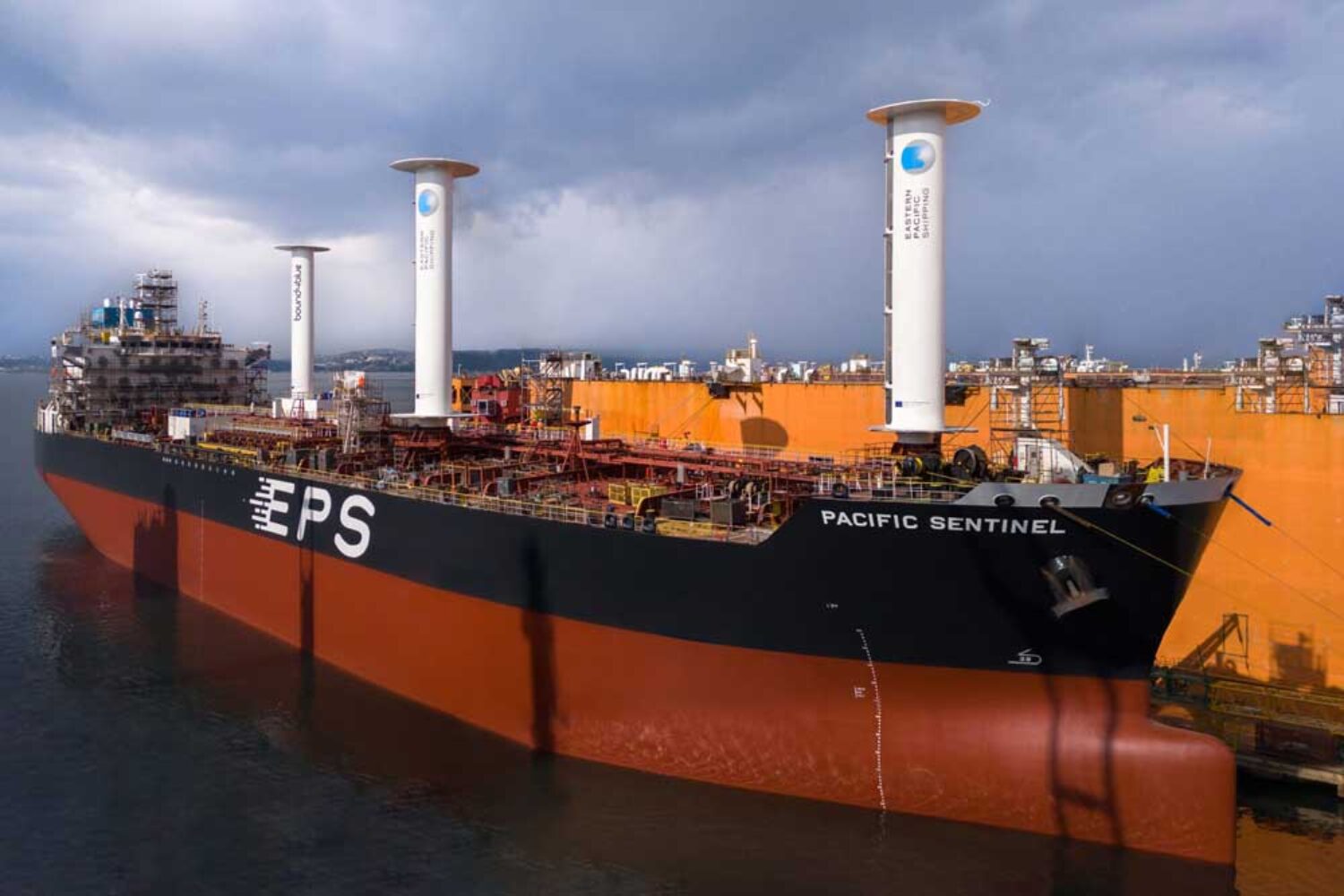The Spanish company Bound4blue has completed another project: The tanker “Pacific Sentinel” of the shipping company Eastern Pacific Shipping (EPS) is now sailing with wind-assisted propulsion.
During a docking at the Besiktas shipyard in Turkey, three 22-meter-long “eSails” were installed on the 50,000-ton vessel.
The autonomous wind-assisted propulsion system (WAPS) will enable the ship to consume around 10% less fuel in future. This will also reduce operating costs and emissions, the company announced. The sails have been tested and approved by DNV.
First tanker with Bound4Blue technology
This next installation of its eSails is an important milestone for Bound4Blue, the company added. The “Pacific Sentinel” is the first vessel to use EPS wind-assisted propulsion technology and the first tanker to be equipped by Bound4Blue. The company has implemented a fast “single-stop” process that ensures minimal downtime of the vessel as all work is carried out during scheduled shipyard maintenance. The fast, single-stop installation combined the ground work on the vessel, such as fitting bases for the sails and welding, with the simultaneous preparation and programming of the sails.this efficient approach helped to minimize installation time.
“We are committed to helping ship owners like EPS harness clean, proven wind energy in the simplest, most cost-efficient and effective way possible,” said Bound4Blue CEO David Ferrer. “Thanks to our collaboration with owners, operators, shipyards and other key partners on all of Bound4Blue’s installations, we have achieved a fast, robust and high-quality deployment process.”
Ferrer adds that the nature of the sails offers further benefits in terms of cost, weight savings and efficiency in an otherwise challenging task. “We believe this is an ‘easy’ way for such vessels and many other demanding marine segments to take advantage of the compelling commercial, regulatory and environmental benefits of wind energy,” he said.
The installation was carried out under the guidance of the American Bureau of Shipping (ABS) to ensure compliance with classification and safety standards. ABS played a crucial role in granting the “wind-assisted” designation, which was critical to the structural integration of the eSails into the vessel and ensured compliance with regulatory frameworks such as the EU ETS, CII and FuelEU Maritime.
Bound4Blue’s “Suction Sails” have now been installed on five ships, with more in a growing order book. Among others, five tankers from the Maersk Tankers fleet are to be retrofitted. EPS, which signed the agreement for the “Pacific Sentinel” in February 2024 and has now successfully completed this installation, further expanded its collaboration with bound4blue in December 2024 with a new agreement for the installation of three eSails on an MR tanker under construction at New Times Shipbuilding in the Chinese province of Jiangsu. The installation is scheduled for the end of 2025.
EPS commits to decarbonization
Commenting on the collaboration with the Spanish company, Mirtcho Spassov, Decarbonization Manager at EPS, said: “We are committed to reducing emissions across our fleet by using state-of-the-art green technologies, including wind-assisted propulsion. We need the right partners to make a significant impact and we have found Bound4Blue, with its proven technology and solution-oriented approach, to be a great fit. This successful installation is a testament to our partnership, and we look forward to leveraging the benefits of wind propulsion to support our decarbonization efforts.”
The way eSails work differs from conventional sails. Air is drawn over an aerodynamic surface to generate greater propulsion efficiency. The technology is suitable for both newbuilds and retrofits in most ship segments, including tankers, bulk carriers, RoRo vessels, cruise ships, ferries, gas tankers and general cargo ships. The technology is designed to help shipping companies simplify and benefit from compliance with regulations such as EU ETS, CII and FuelEU Maritime. The typical payback period is stated by Bound4Blue to be less than five years.













